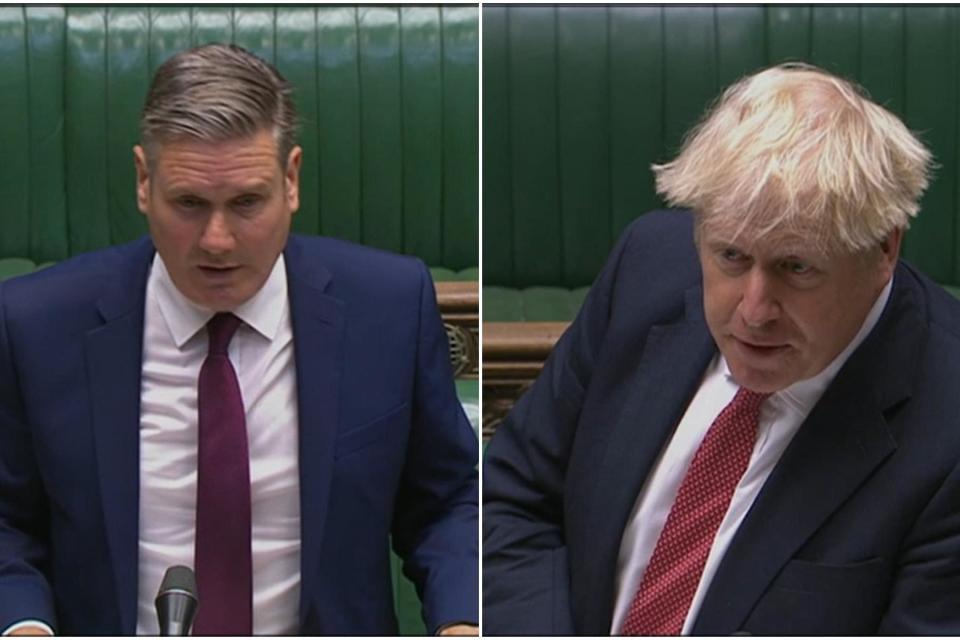The leader that ups his rhetorical game will come out on top this autumn

The worst thing that Boris Johnson can do, which he foolishly did at Prime Minister’s Questions yesterday, is to rile Sir Keir Starmer. The standard critique of the new Labour leader, which he rather encouragingly shares himself, is that he has the forensic capacity one would expect of a top lawyer but that he struggles to tell a story. When Mr Johnson accused his opponent of, in effect, sanctioning support for the IRA, Sir Keir’s evident anger was a really welcome addition to his repertoire as an orator. It’s a great line to be able to say you have prosecuted terrorists, but the anger communicated even more. It said that he cared.
PMQs is performance theatre but that does not mean it does not matter. Politics demands performance and its theatre is part of the spectacle. The two leaders put on a show every week before their colleagues whose morale ebbs and flows in strict accordance with how their man goes. It also reveals, as all oratory does, the contrasting character virtues and defects of the two men competing for the top job. Whoever can become the complete speaker will also become the more appealing politician. There is a great prize here.
Boris Johnson is, as he showed yesterday, liable to skimp on the detail. He is too likely to resort to waffle in clichés and to name-calling. The Prime Minister was upbraided by the Speaker for waffling on about Brexit, the IRA, Nato and anti-Semitism rather than actually answering the question. However, there is always something indisputably Boris-like about him when he speaks. This is a significant virtue which he shares with President Trump who, no matter what he is saying, is always Trump-like when he says it. Most people are not watching politics closely and the ability to communicate in a character type is a priceless asset. That’s why, when he is given something serious to say, Mr Johnson can be very good. His pieces to camera from Downing Street in the early stages of the pandemic were still Boris-like but they were tightly scripted and delivered with a gravity that does not come naturally.
Starmer has the opposite problem, which is that we are not yet quite sure who he is. We do know that he consumes detail. In Left Out, Gabriel Pogrund and Patrick Maguire’s account of the Corbyn years, there is a story about Starmer reading all 599 pages of the EU withdrawal agreement overnight so that he could brief his colleagues. As a speaker, he seems like the kind of man who reads legislation overnight for fun and that forensic capacity is a virtue Mr Johnson lacks. However, Sir Keir needs now to tell a story that describes his character and allows the public to see who he is.

The finest performances always merge passion with clarity. Think of Neil Kinnock’s brilliant speech to the 1985 Labour conference in Bournemouth in which he castigated Liverpool’s Left-wing Labour council for “hiring taxis to scuttle round a city handing out redundancy notices to its own workers”. Kinnock’s anger was palpable but so was his argument. Labour could never win when the Left is in control, he was saying, a lesson the party has needed to learn again.
Boris waffles and skimps on facts but can spin a good yarn. Keir Starmer has the opposite problem
Margaret Thatcher’s speech to the 1980 Conservative conference is known for the line “the lady’s not for turning”. She was under pressure to reverse her course on the economy and her rhetoric told us she was refusing. It was a serious argument which also described the resolute character of the speaker.
Tony Blair’s final speech to Labour conference in 2006 is often remembered for its customised Les Dawson joke — “at least she won’t run off with the guy next door”. The music hall gag made an emotional connection but it has lasted because it came in the setting of a prophetic account of the places in Britain that were in danger of being left behind by globalisation.
The party conference season will be strange this year as the events will be online and the speeches will not be the usual set-pieces. But they will still be a shop window for both leaders. The task for Mr Johnson is to craft an argument that holds. Last week he talked about the government being in calm seas. Today, in an article in The Daily Mail, he says there are choppy waters ahead. He is sinking in metaphor.
Starmer has to summon the spirit he showed when he felt he was being denigrated as a fellow-traveller with the IRA. The pair of them approach the same task from different directions. They are both seeking to become full and rounded political characters. It is by their words this autumn that we shall know them.

 Yahoo Sport
Yahoo Sport 





































